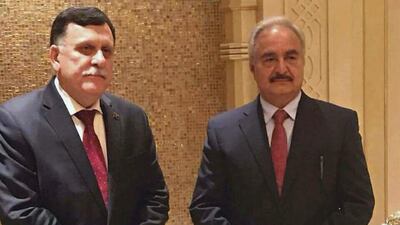ABU DHABI // A summit between warring Libyan leaders may have smoothed the way for peace in the North African state, analysts say.
Experts gave their verdict as Egyptian president Abdel Fattah El Sisi, seen as a key figure in helping Libya find stability, concluded his two-day visit to the UAE on Thursday.
Mr El Sisi is considered a key interlocutor in a potential peace plan, and his presence in Abu Dhabi as Fayez Al Sarraj, prime minister of Libya’s UN-backed government, and Field Marshal Khalifa Haftar, the country’s most powerful military commander, met, was a sign that divisions in the oil-producing state could be healing.
On Wednesday, the UAE hailed a meeting in Abu Dhabi between the two rivals as a significant breakthrough in talks aimed at ending the conflict.
Libya has been beset by chaos since the overthrow of Col Muammar Gaddafi in October 2011. Warring factions, competition for the country’s vast oil supplies and the rise of ISIL have contributed to lawlessness and instability.
Field Marshal Haftar is the dominant figure for factions in eastern Libya that have rejected the government in Tripoli.
“President El Sisi’s official visit to the UAE comes at a very significant time,” said Dr Albadr Al Shateri, politics professor at the National Defence College.
“It comes at a time of the Saudi-Egyptian rapprochement and the reconciliation in Libya between Fayez Al Sarraj, the prime minister, and Khalifa Haftar, the army commander, in Abu Dhabi.”
Sheikh Mohammed bin Zayed, Crown Prince of Abu Dhabi and Deputy Supreme Commander of the Armed Forces, tweeted on Wednesday night that conditions in the region required the strengthening of solidarity to enable the Arab world to maintain security and stability.
Ties between the UAE and Egypt have grown in recent years as the UAE provided extensive support to Cairo.
“That has proved crucial,” said Sabahat Khan, senior analyst at the Institute for Near East and Gulf Military Analysis in Dubai.
And that alliance has turned to address threats in the region.
“We know Egypt and the UAE have also been coordinating very closely on a number of shared interests – in particular the conflict in Libya.”
He said Cairo and Abu Dhabi were at the forefront of efforts to end Libya’s civil war.
“And so as Libya’s two main political rivals – prime minister Fayez Al Sarraj and Field Marshal Khalifa Haftar – finally [had] a face-to-face meeting in Abu Dhabi after many months of effort, president El Sisi’s visit takes an additional dimension and significance,” he said.
Abdelaziz Alkhamis, a Saudi researcher in Middle Eastern affairs, said: “What is important is to unite Libyans against terrorist groups with the help of Egyptians.”
He said that the main issue for the UAE and Egypt was to prevent terrorist groups such as ISIL from operating in Libya.
“The Americans also want Libya to be united,” Mr Alkhamis said. “So this will definitely help.”
Dr Al Shateri, from the NDC, said the situation in Yemen was an issue that the UAE and Egypt would probably have discussed.
“It might see a decisive conclusion,” he said.
“Egypt has offered to participate with greater land forces in Yemen. Another issue that Abu Dhabi and Cairo are worried about is the situation in Syria and what a peaceful settlement might look like.
“Although all the ducks are not yet in a row, both countries are concerned with the day after the regime might tumble.”
cmalek@thenational.ae

